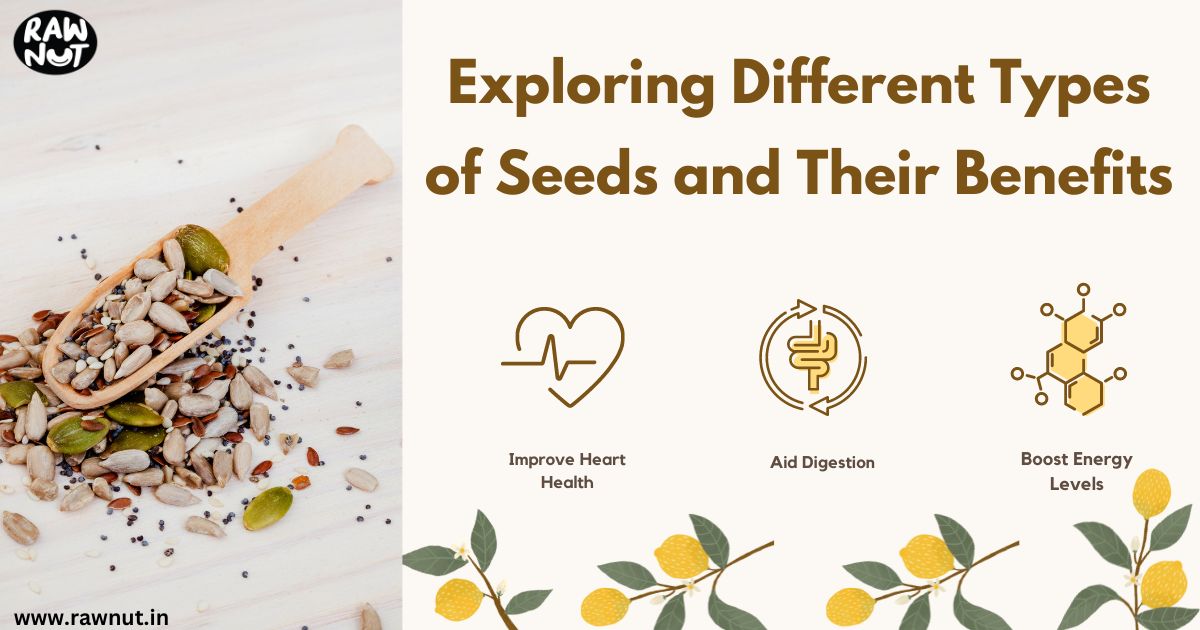
Exploring Different Types of Seeds and Their Benefits
Seeds are tiny powerhouses packed with essential nutrients that offer numerous health benefits. From chia seeds to flaxseeds, incorporating a variety of seeds into your diet can improve your overall health and well-being. In this article, we will explore different types of seeds and their benefits, providing you with the information you need to make these superfoods a part of your daily routine.
Nutritional Benefits of Seeds
Seeds are rich in vitamins, minerals, healthy fats, fiber, and protein. They are known to support heart health, aid digestion, boost energy levels, and improve skin health. Including a variety of seeds in your diet can enhance your nutritional intake and provide a range of health benefits.
Types of Seeds and Their Benefits
#1. Chia Seeds
What are Chia Seeds?
Chia seeds come from the Salvia hispanica plant, which is native to Mexico and Guatemala. These tiny, black or white seeds have been consumed for centuries due to their nutritional benefits and are known for their ability to absorb liquid and form a gel-like texture.
Nutritional Profile
- High in omega-3 fatty acids, fiber, protein, and antioxidants.
- Contains calcium, magnesium, and phosphorus.
Health Benefits
- Heart Health: Omega-3 fatty acids help reduce inflammation and support cardiovascular health.
- Digestive Health: High fiber content aids digestion and promotes regular bowel movements.
- Weight Management: Fiber and protein help keep you full longer, reducing overall calorie intake.
How to Use
- Add to smoothies, yogurt, oatmeal, or make chia pudding by soaking them in liquid.
#2. Flaxseeds
What are Flaxseeds?
Flaxseeds, also known as linseeds, come from the flax plant (Linum usitatissimum). They are small, brown, or golden seeds that have been prized for their health-protective properties for thousands of years.
Nutritional Profile
- Rich in omega-3 fatty acids, fiber, and lignans.
- Good source of protein, magnesium, and vitamin B1.
Health Benefits
- Hormonal Balance: Lignans may help balance hormones and reduce the risk of certain cancers.
- Digestive Health: High fiber content supports digestive health and prevents constipation.
- Heart Health: Omega-3 fatty acids contribute to reducing cholesterol levels and improving heart health.
How to Use
- Ground flaxseeds are easier to digest. Add them to smoothies, baked goods, or sprinkle on salads and cereals.
#3. Pumpkin Seeds
What are Pumpkin Seeds?
Pumpkin seeds, also known as pepitas, are edible seeds of the pumpkin or other squash varieties. They are typically flat and oval-shaped, with a light green color and a white outer hull.
Nutritional Profile
- High in antioxidants, magnesium, zinc, and healthy fats.
- Good source of protein and fiber.
Health Benefits
- Immune Support: Rich in zinc, which is essential for a healthy immune system.
- Heart Health: Magnesium supports heart health and helps regulate blood pressure.
- Sleep Quality: Contains tryptophan, which can help improve sleep quality.
How to Use
- Enjoy roasted as a snack, or add to salads, granola, and baked goods.
#4. Sunflower Seeds
What are Sunflower Seeds?
Sunflower seeds come from the large flower heads of the sunflower plant (Helianthus annuus). They are typically small, oval seeds with a black and white striped shell and a light-colored kernel.
Nutritional Profile
- High in vitamin E, selenium, magnesium, and healthy fats.
- Good source of protein and fiber.
Health Benefits
- Skin Health: Vitamin E supports skin health and protects against oxidative damage.
- Anti-Inflammatory: Selenium and vitamin E work together to reduce inflammation.
- Heart Health: Magnesium helps maintain normal blood pressure and supports heart health.
How to Use
- Eat them raw or roasted, add to salads, or use sunflower seed butter as a spread.
#5. Sesame Seeds
What are Sesame Seeds?
Sesame seeds come from the Sesamum indicum plant and are one of the oldest oilseed crops known to humanity. They are small, flat, oval seeds that can be white, black, or brown.
Nutritional Profile
- Rich in calcium, magnesium, iron, and healthy fats.
- Contains fiber and protein.
Health Benefits
- Bone Health: High calcium content supports bone health and density.
- Antioxidant Properties: Contains lignans and phytosterols that help reduce cholesterol levels.
- Hormonal Balance: Lignans may help balance hormones and support overall health.
How to Use
- Sprinkle on salads, stir-fries, or baked goods, or use tahini (sesame seed paste) in dressings and dips.
#6. Hemp Seeds
What are Hemp Seeds?
Hemp seeds come from the Cannabis sativa plant and are known for their rich nutritional profile. They are small, brown seeds that have a mild, nutty flavor and are often referred to as hemp hearts.
Nutritional Profile
- High in omega-3 and omega-6 fatty acids, protein, and magnesium.
- Contains iron and zinc.
Health Benefits
- Heart Health: Omega fatty acids support heart health and reduce inflammation.
- Muscle Health: High-quality protein supports muscle growth and repair.
- Skin Health: Healthy fats contribute to glowing skin and may reduce skin conditions like eczema.
How to Use
- Add to smoothies, yogurt, salads, or use hemp seed oil in dressings and cooking.
FAQs
Q1: How many seeds should I eat daily?
Aim for about 1-2 tablespoons of seeds per day, but it can vary depending on your dietary needs and preferences.
Q2: Can I eat seeds if I have allergies?
Some seeds, like sesame and sunflower, can cause allergic reactions in some individuals. Consult with a healthcare provider if you have any concerns.
Q3: Are seeds suitable for children?
Yes, seeds can be a healthy addition to a child’s diet, but ensure they are appropriately prepared to avoid choking hazards, especially for young children.
Conclusion:
Incorporating a variety of seeds into your diet can provide numerous health benefits, from improving heart health to enhancing digestion and skin health. By exploring different types of seeds and their benefits, you can make informed choices about which seeds to include in your meals. Remember to enjoy seeds in moderation and consult with a healthcare provider if you have any specific dietary concerns.


